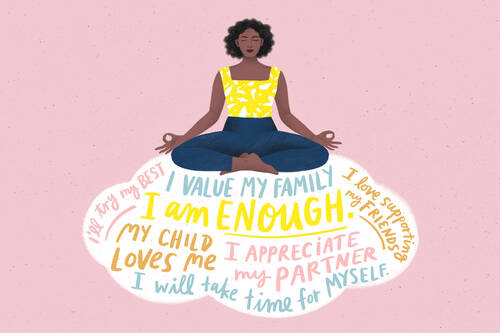| For those of us of a certain age, the term "affirmation" is forever linked with the "Saturday Night Live" character Stuart Smalley, he of the Easter-egg colored clothing, the bouffant hair and the forced smile. Stuart's favorite affirmation was, "I'm good enough, I'm smart enough, and doggone it, people like me." The "Daily Affirmation With Stuart Smalley" segments made me cringe. But as reporter Allyson Chiu writes, research has shown that, if done properly, self-affirmation actually works as a shield against stress. Stuart's way — sincerely delivering platitudes to himself in a mirror — is ineffective. What's effective is to use self-affirmation to remind yourself about what you value, which will strengthen your sense of self and help you cope with life's indignities, large and small. After all, repeating "Doggone it, people like me" isn't going to help much on a day when your boss berates you, your friends abandon you, or you simply don't believe it's true. If strong family bonds are important to you, you could instead tell yourself "My family loves me" – and because that affirmation reflects your priorities and what truly matters, it is more likely to make a difference. (Caveat: When your kids are teenagers, this affirmation might not work as well.) Some online readers scoffed at the article in the comments: "When I read these articles, I wonder, how did our ancestors ever make it out alive before such wisdom was discovered?" Others shared what works for them regarding self-affirmation, including gratitude journals (also mentioned in Allyson's story). On a slightly different topic that I found interesting, a commenter mentioned a mental strategy called WOOP (Wish, Outcome, Obstacle, Plan), which is a twist on positive thinking that offers what its inventor, psychologist Gabriele Oettingen, says is a successful, research-based approach to achieving goals. According to Oettingen, positive thinking alone isn't going to help you reach your goals any more than empty affirmation is going to help you build a stronger sense of self. The reason you can't fantasize your way to a goal is because fantasizing doesn't lead to action. Instead, you need to need to come up with a plan. To do that, says Oettinger, author of "Rethinking Positive Thinking: Inside the New Science of Motivation," you should consider what obstacles inside yourself are keeping you from trying to achieve that goal (an approach called mental contrasting) and design a strategy to overcome them. In an interview with Shankar Vedantam, host of the podcast "Hidden Brain," Oettingen gave an example of using WOOP. Say your Wish is to go on a date with someone you have a crush on. The best Outcome would be having such a great time that it leads to more dates. The Obstacle within you might be fear of rejection. The Plan to overcome that fear might be to remind yourself that rejection would leave you no worse off than you are now — dateless. What do you have to lose? In fact, what do you have to lose by trying a WOOP of your own? (I'm working on one about remembering to take my vitamins.) Read more about WOOP here or download the app for iPhone or Android. And take care. |












No comments:
Post a Comment